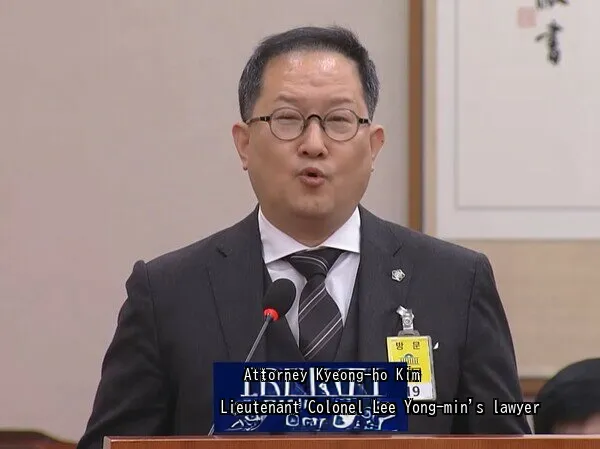
image text translation
Attorney Kyeong-ho Kim
Lieutenant Colonel Lee Yong-min’s lawyer
Lawyer Kim Kyung-ho TV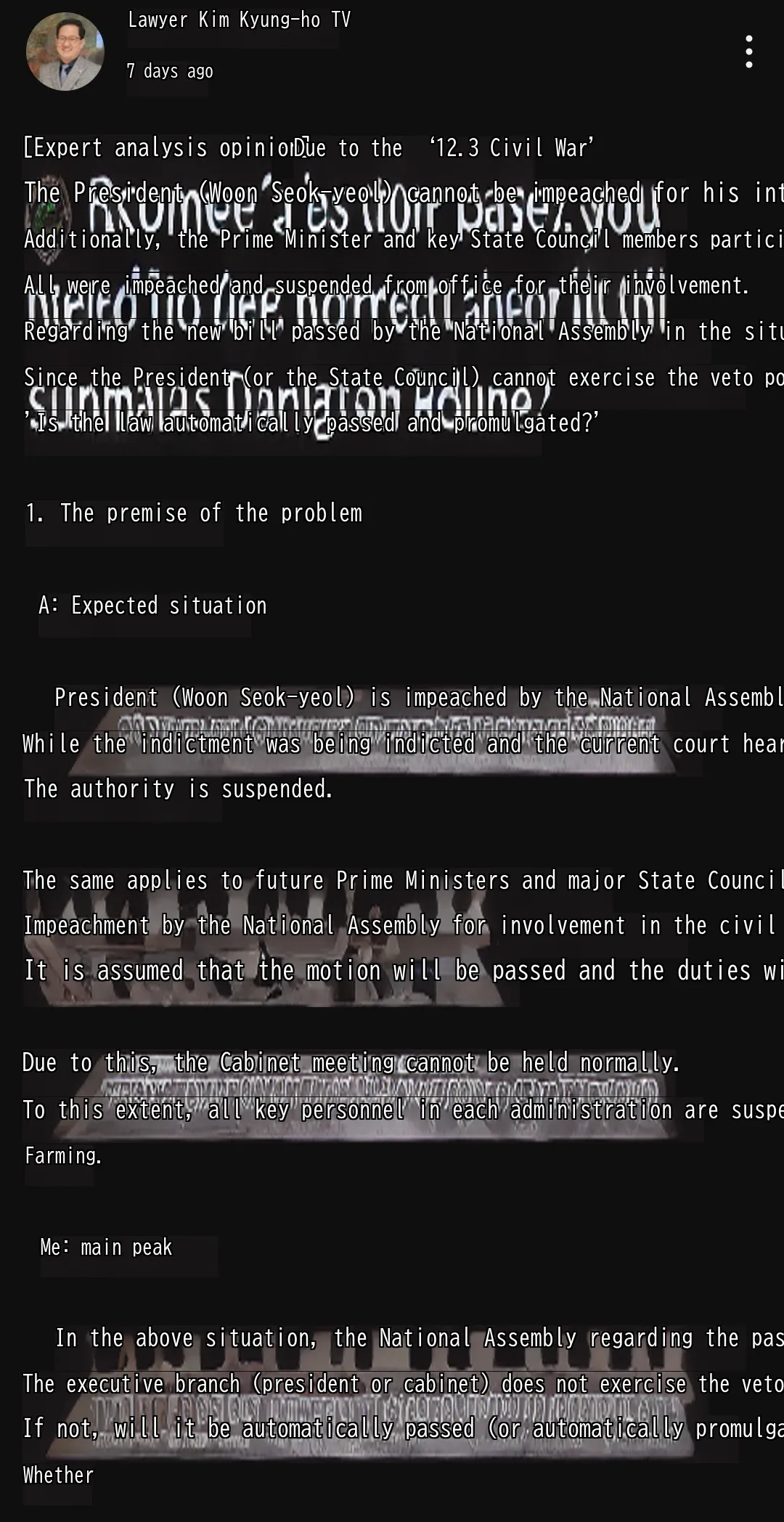
image text translation
7 days ago
II
[Expert analysis opinion]
Due to the ‘12.3 Civil War’
The President (Woon Seok-yeol) cannot be impeached for his intentions to be the leader of the rebellion.
Additionally, the Prime Minister and key State Council members participated in the civil war.
All were impeached and suspended from office for their involvement.
Regarding the new bill passed by the National Assembly in the situation of Jeong Ji-won
Since the President (or the State Council) cannot exercise the veto power,
‘Is the law automatically passed and promulgated?’
1. The premise of the problem
A: Expected situation
President (Woon Seok-yeol) is impeached by the National Assembly on the charge of being a ‘rebellion leader’
While the indictment was being indicted and the current court hearing was in progress, the President
The authority is suspended.
The same applies to future Prime Ministers and major State Council members.
Impeachment by the National Assembly for involvement in the civil war.
It is assumed that the motion will be passed and the duties will be suspended.
Due to this, the Cabinet meeting cannot be held normally.
To this extent, all key personnel in each administration are suspended from their duties.
Farming.
Me: main peak
In the above situation, the National Assembly regarding the passage law,
The executive branch (president or cabinet) does not exercise the veto power
If not, will it be automatically passed (or automatically promulgated) immediately?
Whether_
2. Suspension of authority following impeachment of the President, Prime Minister, and State Council members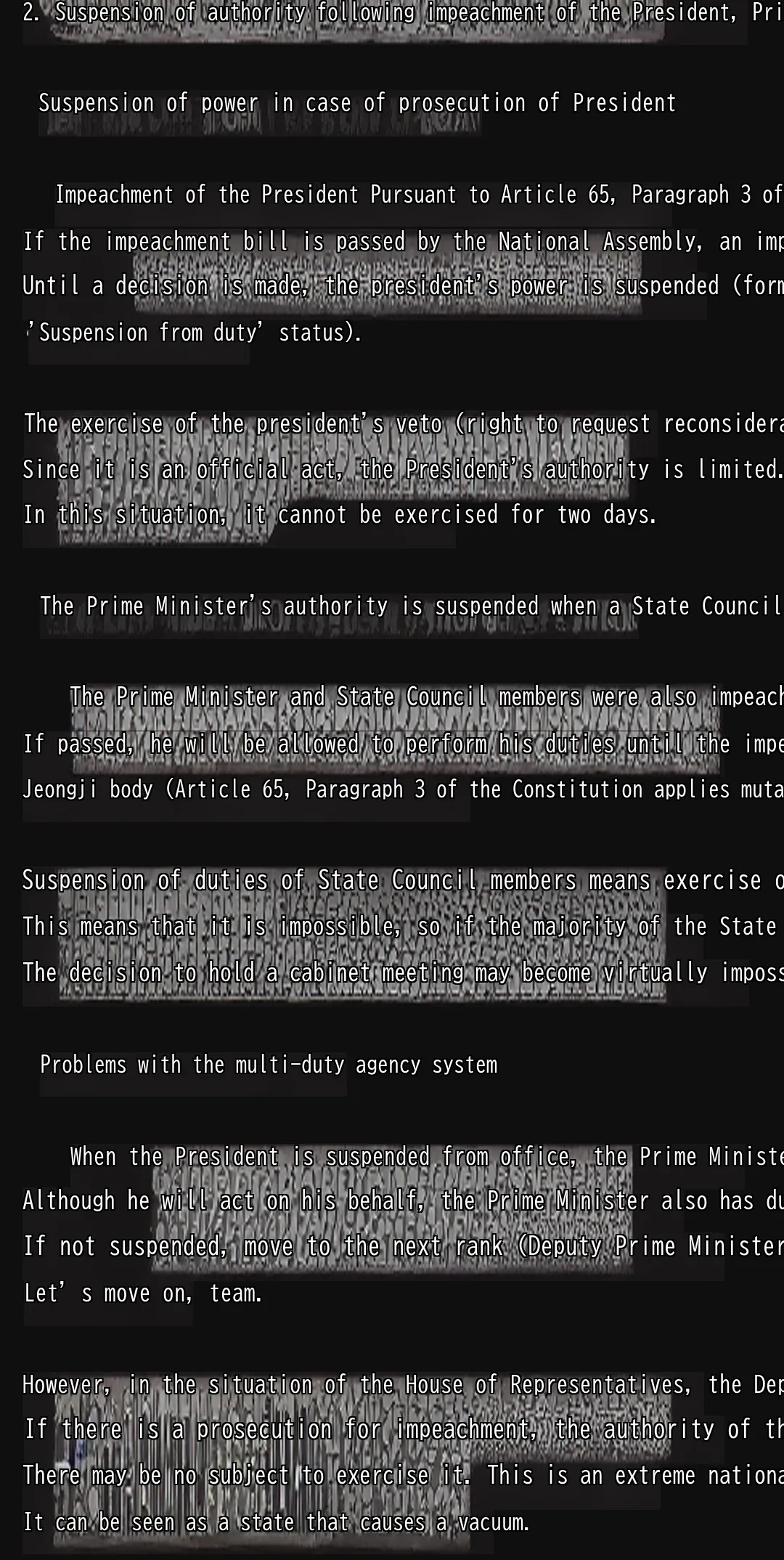
image text translation
Suspension of power in case of prosecution of President
Impeachment of the President Pursuant to Article 65, Paragraph 3 of the Constitution
If the impeachment bill is passed by the National Assembly, an impeachment trial will be held at the Constitutional Court.
Until a decision is made, the president’s power is suspended (formally).
‘Suspension from duty’ status).
The exercise of the president’s veto (right to request reconsideration of legislation) is also possible.
Since it is an official act, the President’s authority is limited.
In this situation, it cannot be exercised for two days.
The Prime Minister’s authority is suspended when a State Council member is prosecuted for desecration.
The Prime Minister and State Council members were also impeached by the National Assembly.
If passed, he will be allowed to perform his duties until the impeachment trial decision is made.
Jeongji body (Article 65, Paragraph 3 of the Constitution applies mutatis mutandis).
Suspension of duties of State Council members means exercise of voting rights at the State Council
This means that it is impossible, so if the majority of the State Council members have the power to prosecute
The decision to hold a cabinet meeting may become virtually impossible.
Problems with the multi-duty agency system
When the President is suspended from office, the Prime Minister generally
Although he will act on his behalf, the Prime Minister also has duties.
If not suspended, move to the next rank (Deputy Prime Minister, Acting Minister, etc.)
Let’s move on, team.
However, in the situation of the House of Representatives, the Deputy Prime Minister and all major State Council members
If there is a prosecution for impeachment, the authority of the head of the executive branch is ‘de facto’ lost.
There may be no subject to exercise it. This is an extreme national situation.
It can be seen as a state that causes a vacuum.
3. Veto and promulgation procedures for bills passed by the National Assembly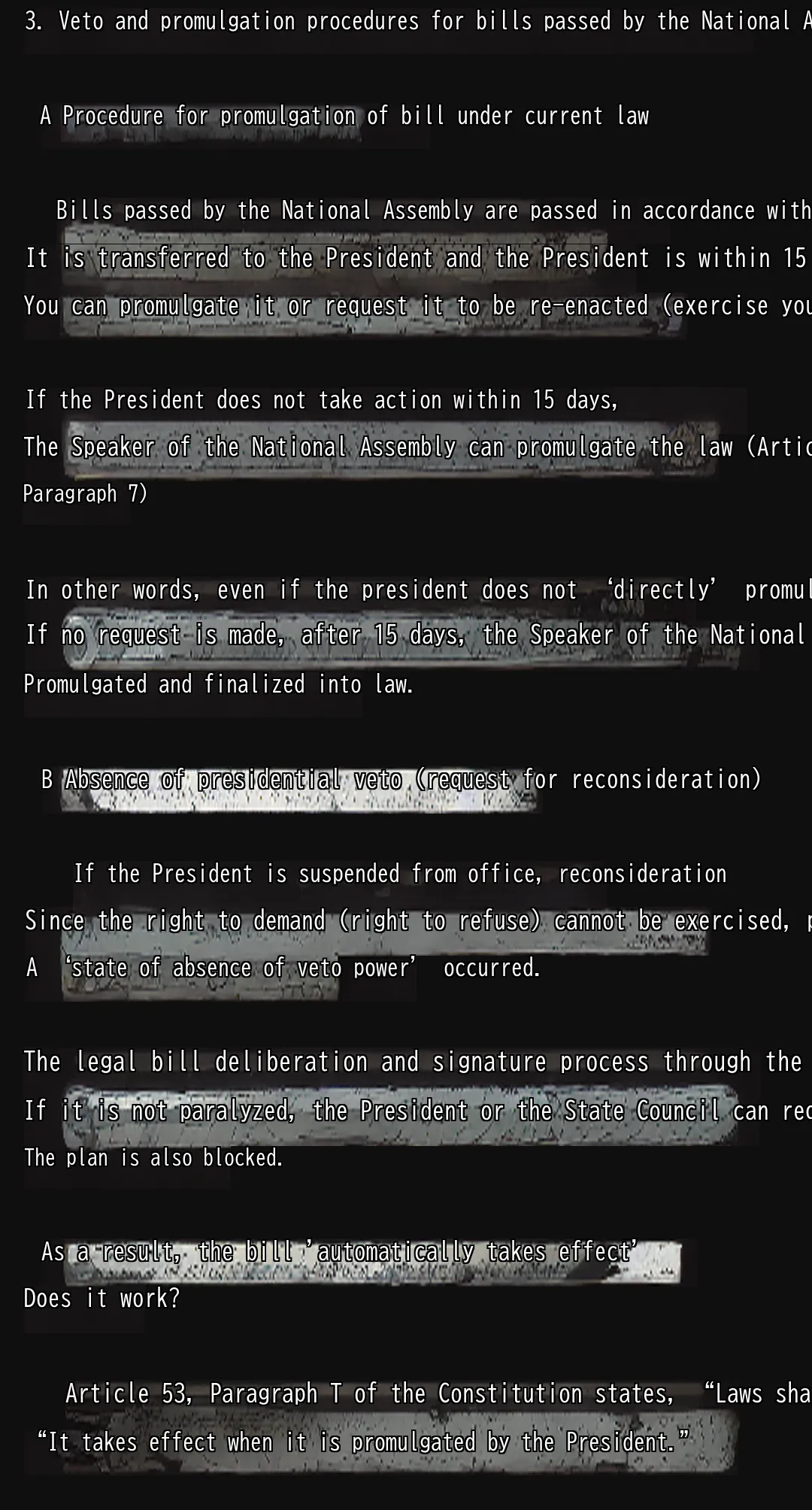
image text translation
A Procedure for promulgation of bill under current law
Bills passed by the National Assembly are passed in accordance with Article 53 of the Constitution.
It is transferred to the President and the President is within 15 days.
You can promulgate it or request it to be re-enacted (exercise your right to veto).
If the President does not take action within 15 days,
The Speaker of the National Assembly can promulgate the law (Article 53 of the Constitution)
Paragraph 7)
In other words, even if the president does not ‘directly’ promulgate it, it can be reconsidered.
If no request is made, after 15 days, the Speaker of the National Assembly
Promulgated and finalized into law.
B Absence of presidential veto (request for reconsideration)
If the President is suspended from office, reconsideration
Since the right to demand (right to refuse) cannot be exercised, practically
A ‘state of absence of veto power’ occurred.
The legal bill deliberation and signature process through the government axis (State Council) is also
If it is not paralyzed, the President or the State Council can request reconsideration.
The plan is also blocked.
As a result, the bill ‘automatically takes effect’
Does it work?
Article 53, Paragraph T of the Constitution states, “Laws shall be passed by the National Assembly.
“It takes effect when it is promulgated by the President.”
However, within the deadline set by Article 53, Paragraph 2, the President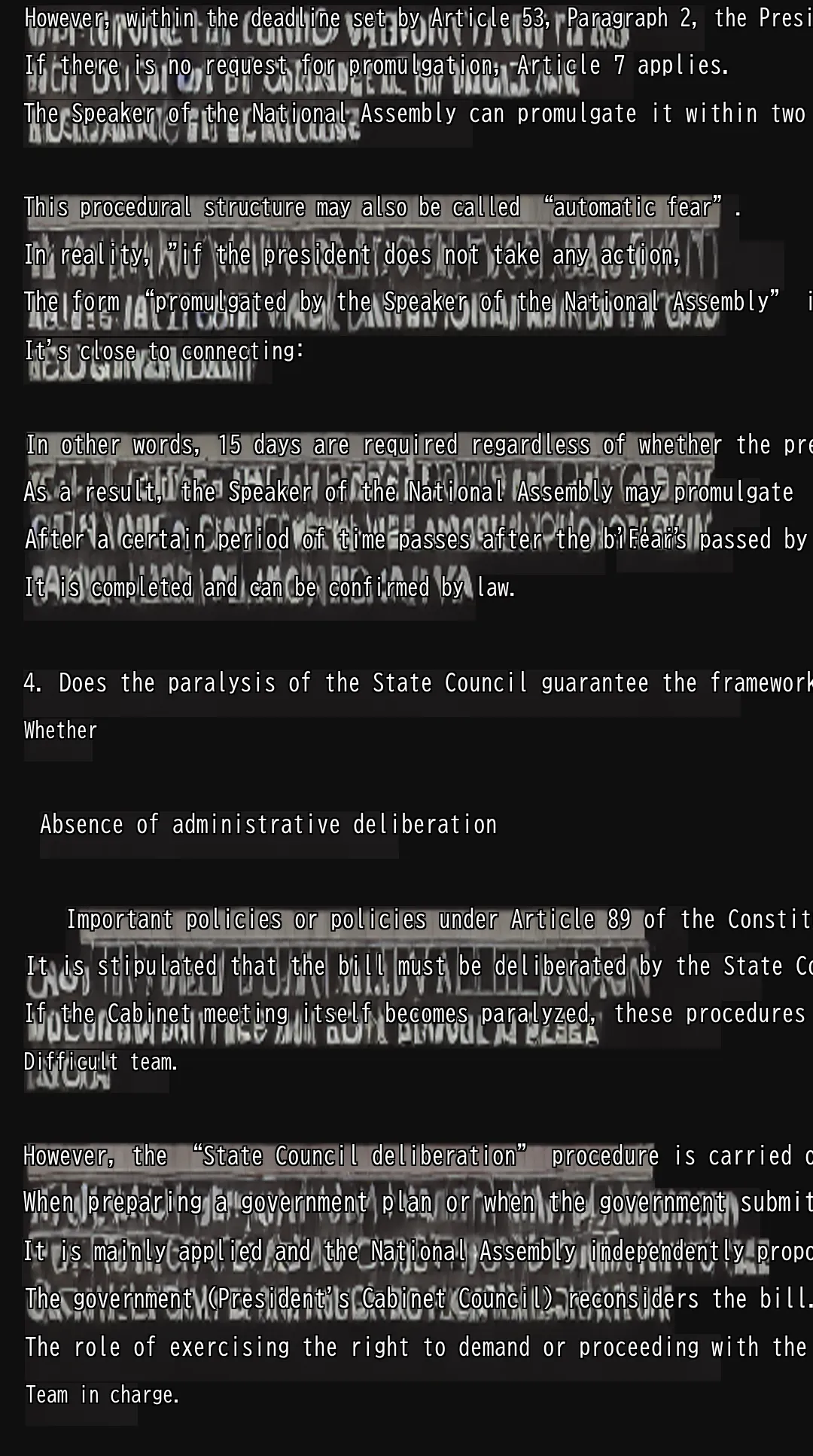
image text translation
If there is no request for promulgation, Article 7 applies.
The Speaker of the National Assembly can promulgate it within two days.
This procedural structure may also be called “automatic fear”.
In reality, “if the president does not take any action,
The form “promulgated by the Speaker of the National Assembly” is provided in the Constitution.
It’s close to connecting:
In other words, 15 days are required regardless of whether the president exercises his veto or not.
As a result, the Speaker of the National Assembly may promulgate
After a certain period of time passes after the bill is passed by the National Assembly,
‘Fear’
It is completed and can be confirmed by law.
4. Does the paralysis of the State Council guarantee the framework of ‘automatic passage of bills’?
Whether
Absence of administrative deliberation
Important policies or policies under Article 89 of the Constitution and the Government Organization Act
It is stipulated that the bill must be deliberated by the State Council, but
If the Cabinet meeting itself becomes paralyzed, these procedures cannot be implemented.
Difficult team.
However, the “State Council deliberation” procedure is carried out in the legislative process.
When preparing a government plan or when the government submits a bill to the National Assembly
It is mainly applied and the National Assembly independently proposes and approves it.
The government (President’s Cabinet Council) reconsiders the bill.
The role of exercising the right to demand or proceeding with the promulgation process
Team in charge.
B Final instrument of Article 53 of the Constitution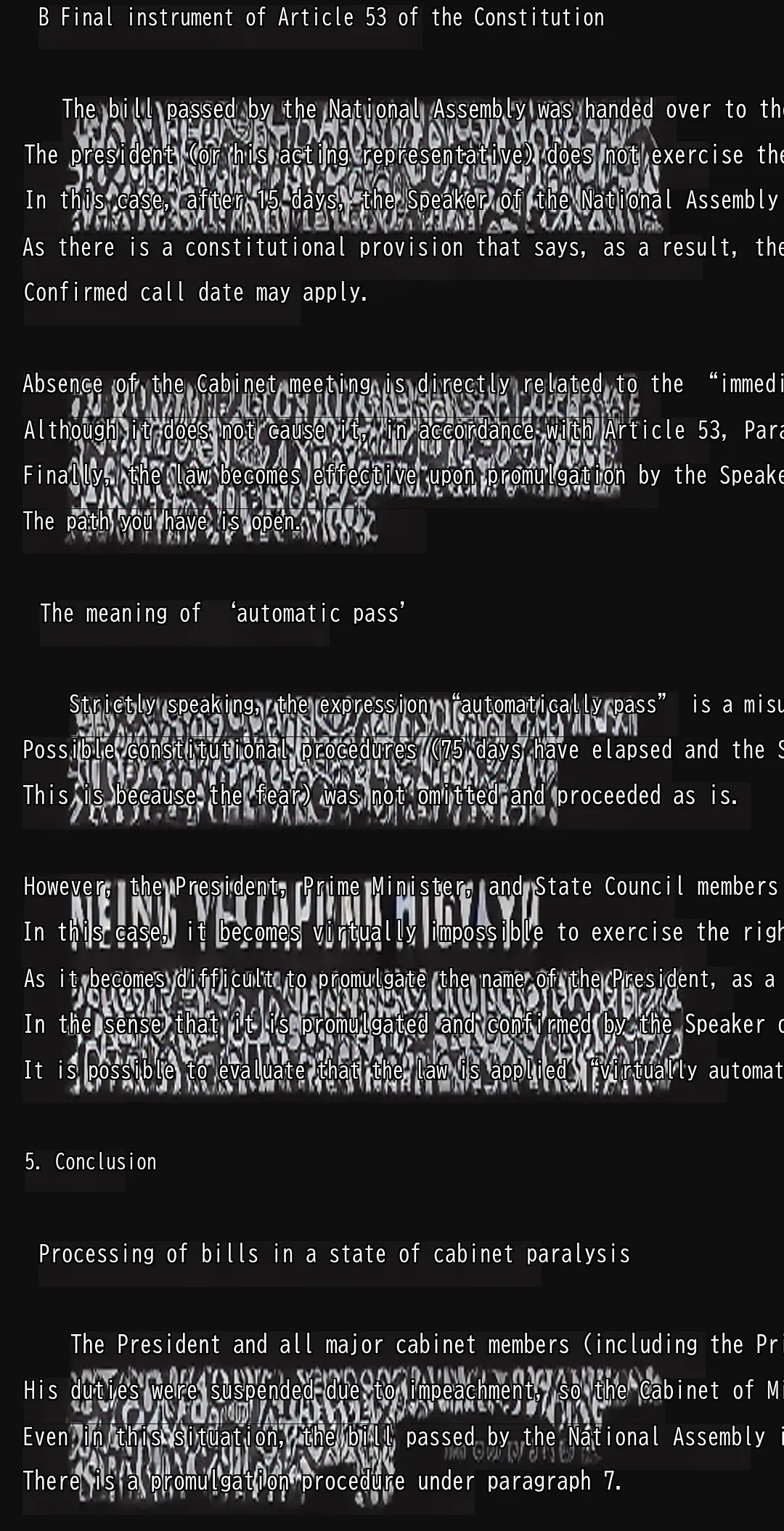
image text translation
The bill passed by the National Assembly was handed over to the President after Lee Seung-won
The president (or his acting representative) does not exercise the veto power.
In this case, after 15 days, the Speaker of the National Assembly may promulgate a law.
As there is a constitutional provision that says, as a result, the bill
Confirmed call date may apply.
Absence of the Cabinet meeting is directly related to the “immediate automatic call” framework.
Although it does not cause it, in accordance with Article 53, Paragraph 7 of the Constitution
Finally, the law becomes effective upon promulgation by the Speaker of the National Assembly.
The path you have is open.
The meaning of ‘automatic pass’
Strictly speaking, the expression “automatically pass” is a misunderstanding.
Possible constitutional procedures (75 days have elapsed and the Speaker of the National Assembly
This is because the fear) was not omitted and proceeded as is.
However, the President, Prime Minister, and State Council members are all suspended from their duties.
In this case, it becomes virtually impossible to exercise the right to veto.
As it becomes difficult to promulgate the name of the President, as a result, the bill
In the sense that it is promulgated and confirmed by the Speaker of the National Assembly
It is possible to evaluate that the law is applied “virtually automatically.”
5. Conclusion
Processing of bills in a state of cabinet paralysis
The President and all major cabinet members (including the Prime Minister)
His duties were suspended due to impeachment, so the Cabinet of Ministers was appointed as Mabinium.
Even in this situation, the bill passed by the National Assembly is Article 53 of the Constitution.
There is a promulgation procedure under paragraph 7.
The President (or the acting Prime Minister, etc.) responds to the bill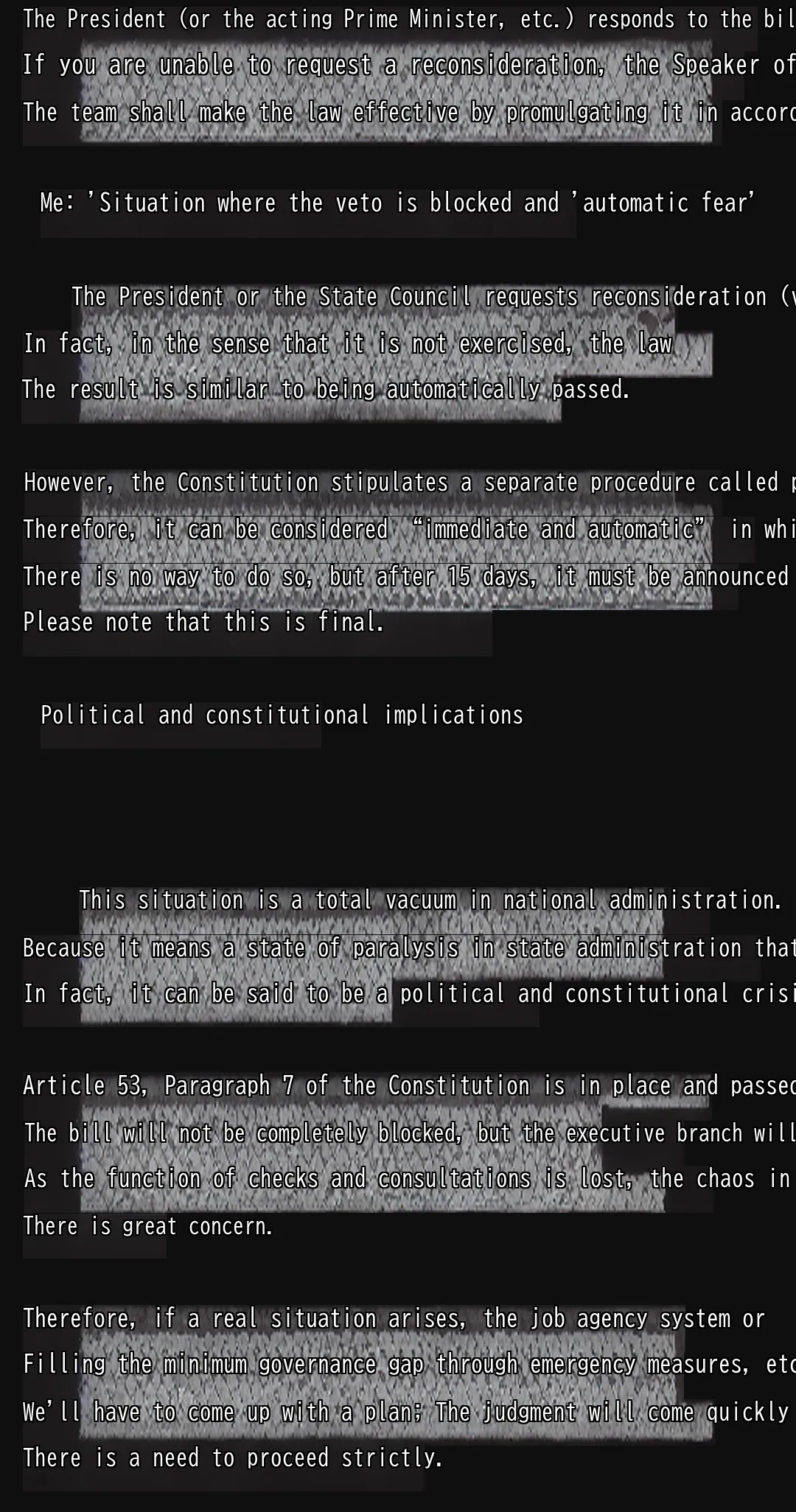
image text translation
If you are unable to request a reconsideration, the Speaker of the National Assembly is appointed by the current law.
The team shall make the law effective by promulgating it in accordance with the procedures.
Me: ‘Situation where the veto is blocked and ‘automatic fear’
The President or the State Council requests reconsideration (veto)
In fact, in the sense that it is not exercised, the law
The result is similar to being automatically passed.
However, the Constitution stipulates a separate procedure called promulgation of the Speaker of the National Assembly.
Therefore, it can be considered “immediate and automatic” in which the procedure itself is omitted.
There is no way to do so, but after 15 days, it must be announced by the Speaker of the National Assembly.
Please note that this is final.
Political and constitutional implications
This situation is a total vacuum in national administration.
Because it means a state of paralysis in state administration that is extremely dangerous and illegitimate.
In fact, it can be said to be a political and constitutional crisis.
Article 53, Paragraph 7 of the Constitution is in place and passed by the National Assembly.
The bill will not be completely blocked, but the executive branch will
As the function of checks and consultations is lost, the chaos in government affairs becomes severe.
There is great concern.
Therefore, if a real situation arises, the job agency system or
Filling the minimum governance gap through emergency measures, etc.
We’ll have to come up with a plan; The judgment will come quickly and quickly.
There is a need to proceed strictly.
In conclusion, the president and a number of cabinet members were impeached simultaneously.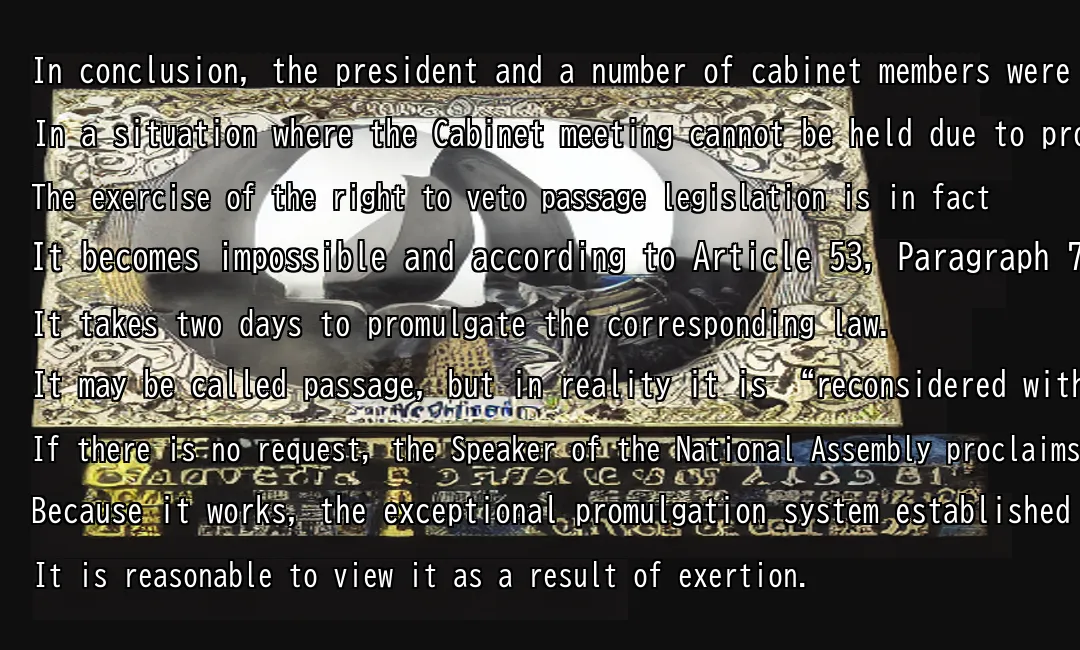
image text translation
In a situation where the Cabinet meeting cannot be held due to prosecution, the National Assembly
The exercise of the right to veto passage legislation is in fact
It becomes impossible and according to Article 53, Paragraph 7 of the Constitution, the Speaker of the National Assembly
It takes two days to promulgate the corresponding law.
It may be called passage, but in reality it is “reconsidered within 15 days.”
If there is no request, the Speaker of the National Assembly proclaims it.” The constitutional procedure is
Because it works, the exceptional promulgation system established under the current law
It is reasonable to view it as a result of exertion.
AI lawyer Kim Kyung-ho kindly informed us~~